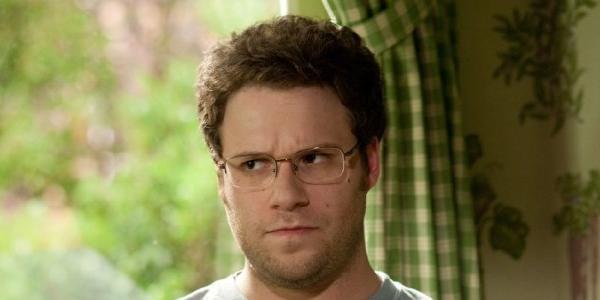The Guilt Trip Review: Babs and Rogen Liven a Dull Trip
Barbra Streisand, one of the most successful and respected entertainers ever, leads a road-trip comedy alongside the comparatively new comedic star Seth Rogen. Anne Fletcher, director of divisively reviewed box-office smash
The Proposal, helms said comedy from a script penned by Dan Fogelman, writer of the well-received
Crazy, Stupid, Love.
This strange combination of talent – the legendary old and the popular new, the respected and the less adored – suggests
The Guilt Trip is something of a mixed bag, and such an assumption wouldn’t be incorrect.

In the film, an inventor (Rogen) takes his widowed and overbearing mother (Streisand) with him as he pitches his nontoxic cleaning product to various companies across the United States. His career aims serve as a way to get
The Guilt Trip rolling along, but this trip focuses more on the dysfunctional relationship between Rogen and Streisand. After all, Rogen plans to reunite Streisand with a former lover at the end of the road trip, but he keeps that part of the trip hidden from her.
In light of everything
The Guilt Trip does wrong, its leading duo sells the necessary dynamic in spades. For the flack Streisand gets for being some sort of egocentric diva (her directing of, well, herself in
The Mirror Has Two Faces lends support to such thinking), she tackles the showy role of widow Joyce Brewster without being
too showy. She’s funny and ever so slightly over-the-top while also bringing the performance home in a dramatic blowout scene.

Streisand also allows onscreen son Rogen some space to shine as Andy. He’s up to the challenge of matching the wit of the naturally funny entertainment titan, though he falters somewhat when
The Guilt Trip calls on him to turn on the waterworks.
The structure of the film, however, often dims their bright performances.
The Guilt Trip opens as Streisand calls Rogen early in the morning – earlier for him than her thanks to time zones — which sets up the kind of relationship we expect the two to have throughout the film, but it’s still a bit stale at this point. Streisand does a great job selling some stock annoying-mother lines she leaves as messages on Rogen’s phone, but she still has to make quite the pitch for such obvious dialogue to work.
Poor framing renders their first scene on screen together thankless despite the best efforts from Streisand. It isn’t until the two share space in her house that genuine rapport builds as she presses Rogen about his love life (or lack thereof) and he passively aggressively dodges her inquiries.

But Fogelman’s screenplay also gets problematic at this point.
The Guilt Trip not only raises Rogen’s love life as an issue; it presents the dilemma as something the characters will resolve as the narrative plays out. It brings this conflict to a moment of heightened tension, only to never build upon or resolve it beyond that. This admittedly small aspect of the film suffices in its relation to the overall conflict between mother and son, but there should be some kind of closure or resolution to Rogen’s own romantic conflict. At least all of Streisand’s conflicts are resolved by movie’s end.
The comedic ember sparked by the leading duo burns brightly as
The Guilt Trip proceeds, though the film still lags for more than raising up an unresolved issue. The attempt at humor can be seen from miles away, though once again, our leads make these predictable situations and lines as fun as they can. Also, there’s a bit too much in
The Guilt Trip for its own good. A scene at a topless bar serves the film no purpose other than to segue into a scene involving Rogen’s unresolved romantic conflict. (Well, the scene also includes a less-than-funny joke about discolored penises, so there’s that.) Essentially, the brief 95-minute running time of
The Guilt Trip feels much longer.

But let’s give credit where credit is due: Streisand becomes the mentored instead of the mentor for the latter half of the film. It’s an interesting and nice change of pace to see this kind of role reversal take place because mothers in film are often simply mentors. More importantly, that aspect of the film works without a hitch.
To write
The Guilt Trip, Fogelman drew on a road trip he actually took with his mother (also named Joyce). One can see how personal much of the film is even without such knowledge, though structural issues and poorly handled opportunities for character arcs hinder the final product. While
The Guilt Trip isn’t a bad trip, more luggage than necessary comes with it. But it’s also a trip you shouldn’t feel guilty about taking with Streisand and Rogen to make the journey worthwhile.
 In the film, an inventor (Rogen) takes his widowed and overbearing mother (Streisand) with him as he pitches his nontoxic cleaning product to various companies across the United States. His career aims serve as a way to get The Guilt Trip rolling along, but this trip focuses more on the dysfunctional relationship between Rogen and Streisand. After all, Rogen plans to reunite Streisand with a former lover at the end of the road trip, but he keeps that part of the trip hidden from her.
In light of everything The Guilt Trip does wrong, its leading duo sells the necessary dynamic in spades. For the flack Streisand gets for being some sort of egocentric diva (her directing of, well, herself in The Mirror Has Two Faces lends support to such thinking), she tackles the showy role of widow Joyce Brewster without being too showy. She’s funny and ever so slightly over-the-top while also bringing the performance home in a dramatic blowout scene.
In the film, an inventor (Rogen) takes his widowed and overbearing mother (Streisand) with him as he pitches his nontoxic cleaning product to various companies across the United States. His career aims serve as a way to get The Guilt Trip rolling along, but this trip focuses more on the dysfunctional relationship between Rogen and Streisand. After all, Rogen plans to reunite Streisand with a former lover at the end of the road trip, but he keeps that part of the trip hidden from her.
In light of everything The Guilt Trip does wrong, its leading duo sells the necessary dynamic in spades. For the flack Streisand gets for being some sort of egocentric diva (her directing of, well, herself in The Mirror Has Two Faces lends support to such thinking), she tackles the showy role of widow Joyce Brewster without being too showy. She’s funny and ever so slightly over-the-top while also bringing the performance home in a dramatic blowout scene.
 Streisand also allows onscreen son Rogen some space to shine as Andy. He’s up to the challenge of matching the wit of the naturally funny entertainment titan, though he falters somewhat when The Guilt Trip calls on him to turn on the waterworks.
The structure of the film, however, often dims their bright performances. The Guilt Trip opens as Streisand calls Rogen early in the morning – earlier for him than her thanks to time zones — which sets up the kind of relationship we expect the two to have throughout the film, but it’s still a bit stale at this point. Streisand does a great job selling some stock annoying-mother lines she leaves as messages on Rogen’s phone, but she still has to make quite the pitch for such obvious dialogue to work.
Poor framing renders their first scene on screen together thankless despite the best efforts from Streisand. It isn’t until the two share space in her house that genuine rapport builds as she presses Rogen about his love life (or lack thereof) and he passively aggressively dodges her inquiries.
Streisand also allows onscreen son Rogen some space to shine as Andy. He’s up to the challenge of matching the wit of the naturally funny entertainment titan, though he falters somewhat when The Guilt Trip calls on him to turn on the waterworks.
The structure of the film, however, often dims their bright performances. The Guilt Trip opens as Streisand calls Rogen early in the morning – earlier for him than her thanks to time zones — which sets up the kind of relationship we expect the two to have throughout the film, but it’s still a bit stale at this point. Streisand does a great job selling some stock annoying-mother lines she leaves as messages on Rogen’s phone, but she still has to make quite the pitch for such obvious dialogue to work.
Poor framing renders their first scene on screen together thankless despite the best efforts from Streisand. It isn’t until the two share space in her house that genuine rapport builds as she presses Rogen about his love life (or lack thereof) and he passively aggressively dodges her inquiries.
 But Fogelman’s screenplay also gets problematic at this point. The Guilt Trip not only raises Rogen’s love life as an issue; it presents the dilemma as something the characters will resolve as the narrative plays out. It brings this conflict to a moment of heightened tension, only to never build upon or resolve it beyond that. This admittedly small aspect of the film suffices in its relation to the overall conflict between mother and son, but there should be some kind of closure or resolution to Rogen’s own romantic conflict. At least all of Streisand’s conflicts are resolved by movie’s end.
The comedic ember sparked by the leading duo burns brightly as The Guilt Trip proceeds, though the film still lags for more than raising up an unresolved issue. The attempt at humor can be seen from miles away, though once again, our leads make these predictable situations and lines as fun as they can. Also, there’s a bit too much in The Guilt Trip for its own good. A scene at a topless bar serves the film no purpose other than to segue into a scene involving Rogen’s unresolved romantic conflict. (Well, the scene also includes a less-than-funny joke about discolored penises, so there’s that.) Essentially, the brief 95-minute running time of The Guilt Trip feels much longer.
But Fogelman’s screenplay also gets problematic at this point. The Guilt Trip not only raises Rogen’s love life as an issue; it presents the dilemma as something the characters will resolve as the narrative plays out. It brings this conflict to a moment of heightened tension, only to never build upon or resolve it beyond that. This admittedly small aspect of the film suffices in its relation to the overall conflict between mother and son, but there should be some kind of closure or resolution to Rogen’s own romantic conflict. At least all of Streisand’s conflicts are resolved by movie’s end.
The comedic ember sparked by the leading duo burns brightly as The Guilt Trip proceeds, though the film still lags for more than raising up an unresolved issue. The attempt at humor can be seen from miles away, though once again, our leads make these predictable situations and lines as fun as they can. Also, there’s a bit too much in The Guilt Trip for its own good. A scene at a topless bar serves the film no purpose other than to segue into a scene involving Rogen’s unresolved romantic conflict. (Well, the scene also includes a less-than-funny joke about discolored penises, so there’s that.) Essentially, the brief 95-minute running time of The Guilt Trip feels much longer.
 But let’s give credit where credit is due: Streisand becomes the mentored instead of the mentor for the latter half of the film. It’s an interesting and nice change of pace to see this kind of role reversal take place because mothers in film are often simply mentors. More importantly, that aspect of the film works without a hitch.
To write The Guilt Trip, Fogelman drew on a road trip he actually took with his mother (also named Joyce). One can see how personal much of the film is even without such knowledge, though structural issues and poorly handled opportunities for character arcs hinder the final product. While The Guilt Trip isn’t a bad trip, more luggage than necessary comes with it. But it’s also a trip you shouldn’t feel guilty about taking with Streisand and Rogen to make the journey worthwhile.
But let’s give credit where credit is due: Streisand becomes the mentored instead of the mentor for the latter half of the film. It’s an interesting and nice change of pace to see this kind of role reversal take place because mothers in film are often simply mentors. More importantly, that aspect of the film works without a hitch.
To write The Guilt Trip, Fogelman drew on a road trip he actually took with his mother (also named Joyce). One can see how personal much of the film is even without such knowledge, though structural issues and poorly handled opportunities for character arcs hinder the final product. While The Guilt Trip isn’t a bad trip, more luggage than necessary comes with it. But it’s also a trip you shouldn’t feel guilty about taking with Streisand and Rogen to make the journey worthwhile.